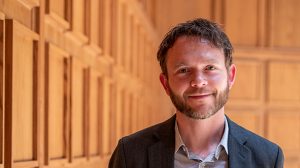February 22, 2023
Bringing new energy to the Peace and Justice program
Taking a bit of a risk paid off for Dr. Tim Lorek in his journey to St. Scholastica. A native Wisconsinite, Lorek spent his early days in academic settings around the country, earning his bachelor of arts degree at Ohio University, his master’s at the University of New Mexico and a doctorate from Yale before joining the staff at the Center for Latin American and Caribbean Studies at the University of Michigan. Even though a hiring freeze put a hold on joining the faculty at St. Scholastica, his family’s desire to be in the Twin Ports area was a strong enough catalyst to move in the midst of the pandemic.
Exciting changes for the Alworth Center
Now in his third year at the College, Lorek is settled into teaching global history and his role as the Director of the Alworth Center for the Study of Peace and Justice. Taking the reins of a long-running program can be a formidable challenge, but Lorek is proving he is up to the task.
To ensure a successful leadership transition, Lorek’s entry into the program overlapped with the retirement of Tom Morgan, who had been the program director since its inception. “Tom’s leadership over the years built a solid foundation that I am glad to continue,” Lorek said. “His vision to promote the kind of understanding that promotes peace and justice is a key part of our work at the Alworth Center.”
 Experience has been an excellent teacher for Lorek. Part of his ongoing research is about agricultural development issues in Colombia, where much of the focus was on justice and peace. Since 2016, Colombia has navigated a rocky peace accord with the hemisphere’s oldest guerrilla insurgency, as well as political turmoil and environmental issues. Lorek’s forthcoming book, Making the Green Revolution: Agriculture and Conflict in Colombia (University of North Carolina Press, 2023), contextualizes the country’s contemporary situation within a longer history of agricultural and environmental politics.
Experience has been an excellent teacher for Lorek. Part of his ongoing research is about agricultural development issues in Colombia, where much of the focus was on justice and peace. Since 2016, Colombia has navigated a rocky peace accord with the hemisphere’s oldest guerrilla insurgency, as well as political turmoil and environmental issues. Lorek’s forthcoming book, Making the Green Revolution: Agriculture and Conflict in Colombia (University of North Carolina Press, 2023), contextualizes the country’s contemporary situation within a longer history of agricultural and environmental politics.
The most visible piece of the program is the annual four- or five-part lecture series held in the Mitchell Auditorium. Speakers include local and national voices and the lectures typically draw several hundred attendees from the College and the wider community, creating a major intellectual forum for the region. Lorek hopes to leverage the existing energy of the lecture series to expand opportunities for student involvement at both the club and academic levels. “Currently, we have a small but dedicated niche group of students who are pre-law or internationally focused. I would love to look at expanding the Peace and Justice program to provide more chances for students to get involved in the community through internships or volunteer work,” Lorek said.
Building momentum
To increase the community-centric functionality, an advisory board comprised of faculty, staff, alumni and community members inform the work of the Peace and Justice center. “Working with a diverse yet like-minded group of individuals to help shape the programming and themes, as well as provide broader connections, has been an excellent addition to the work,” Lorek explained. “Including professionals doing the work that our students are interested in pursuing is a fantastic way to help them envision where their education and their hard work could lead.”
One way the Peace and Justice Center has worked to build momentum on campus is through speaker-adjacent events that help raise awareness about the lecture while offering ways to participate in kind. For example, the new CSS Justice Choir, directed by Richard Carrick, is participating in this year’s series. The choir provided music during the inaugural lecture event with Emily Ford on Sept. 22 and will perform again at the final event on April 26. Also this fall, the College hosted voting drives with the League of Women Voters of Duluth before and during the Oct. 18 panel event. This was the most successful voter drive — in terms of voter registrations per hour — conducted during 2022 for the Duluth chapter of the LWV. Lorek is planning to continue these multifaceted events as a core offering of the program.
“The Peace and Justice program and the Alworth Center are really special,” Lorek said. “Because of the generous vision of the Alworth family more than thirty years ago, this endowment-funded program has grown significantly. We can create unique opportunities for our students and the entire community that highlights the importance of this work.”
Although the Center was endowed decades ago, Karen ’82 and Royal Alworth continue to be involved today, attending lectures and engaging behind the scenes. Karen said, “The Alworth Center for the Study of Peace and Justice has had great success under Dr. Tom Morgan’s leadership. The diversity and depth of topics over the years have been impressive. We are extremely pleased and supportive of the new energy that Tim is bringing to the Alworth Center.”
Lorek added, “After meeting the Alworths, I was even more excited to be part of this. They have been trusting and supportive, open to seeing the program change and grow.”

